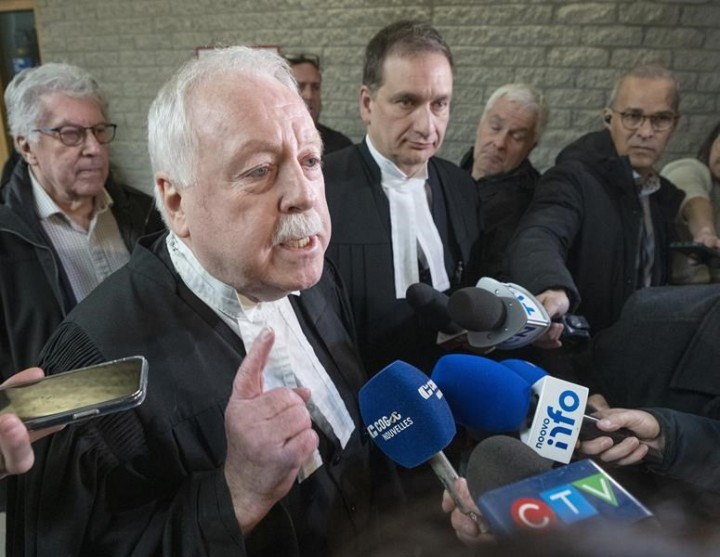OTTAWA – A veteran Ottawa journalist is firing back against what he says are “entirely false” claims by a former Conservative cabinet minister that he acted as a Russian agent.
David Pugliese, a reporter with the Ottawa Citizen, said in a statement posted to X Friday that the claims Chris Alexander made at a House of Commons committee are ridiculous and put his family in danger.
“His statements are entirely false and merely highlight another tactic in the ongoing attacks on Canadian journalism,” Pugliese wrote.
At a public safety and national security committee meeting Thursday, Alexander claimed Pugliese was recruited by Russia because of his role as a journalist. He provided documents to the committee about the claims.
Alexander was an immigration minister in Stephen Harper’s Conservative government and a former Canadian ambassador to Afghanistan.
He also mentioned several subjects Pugliese has recently written about, including alleged Nazi war criminals in Canada and Finance Minister Chrystia Freeland’s grandfather’s Nazi ties.
“These are themes that Moscow would be delighted to promote,” he told MPs.
Postmedia, which owns the Ottawa Citizen, rejected Alexander’s claims in a statement Friday and said it stands firmly behind Pugliese.
“Yesterday, a witness before Parliamentary committee made ridiculous and baseless accusations against David, and suggested his work was compromised by a foreign entity,” the company said.
“At no point have we ever doubted David’s work or integrity, nor have we ever been approached by any intelligence entity concerning David or his work.”
Reached by phone on Friday, Alexander said he stands by the comments he made at the committee and the documents presented to them.
The documents, obtained by The Canadian Press, are described on the cover page as being from the Archives of the State Security Committee in Kyiv, Ukraine, and are dated 1984 through 1990. The translated versions of the documents name Pugliese but largely refer to him as “Stuart,” saying the KGB saw him as a potential asset and sought for one of their agents, “Ivan,” to build a relationship with him.
Alexander told the committee the documents are “evidence of a serious effort to undermine Canada’s national security and collective self-defence,” adding they were authenticated by several experts, and he believes they were shared with the Department of National Defence and Canadian Security Intelligence Service. He said he has been aware of the documents “for many months.”
In an interview, Pugliese said the documents given to the committee are the same ones involved in an ongoing civil lawsuit over reporting he did about allegedly faulty equipment sent to Ukraine.
He said he has no way of knowing whether the documents are real, but that “the claims that I am some kind of Russian agent … that’s fabricated, that’s false.”
He said some specific details in the documents are incorrect. For example, one document dated 1984 describes Pugliese as a journalist in Ottawa, but Pugliese said he did not live in Ottawa that year.
Pugliese said he received no notice from committee that these documents were going to be brought up at Thursday’s meeting nor that Alexander would be speaking about them. He said he has asked the committee to allow him to appear to defend himself but had not received a response as of late Friday afternoon.
The Canadian Association of Journalists denounced the accusations in a statement, saying the claims are dangerous and designed to undermine journalists’ credibility.
“It’s a sad irony these comments were made in a meeting examining disinformation campaigns,” the organization said.
Pugliese said in his statement that Alexander’s claims would be considered libel if they hadn’t been said at a parliamentary committee. Testimony at committees is protected by parliamentary privilege.
“I understand the articles I have written … are upsetting to those in and outside government,” he said.
“However, these articles are accurate. I am proud of my 40 years of journalism. This is what journalism is supposed to be about; publishing things the powerful do not want to see in public.”
Pugliese also said he was disappointed that NDP MP Peter Julian and Conservative MP James Bezan did not push back at Alexander’s claims.
In the meeting, Bezan questioned Alexander on his allegations about Pugliese, calling the documents “disturbing.”
Julian called Alexander’s testimony “stunning” and “explosive.” He asked whether other journalists in Canada could be similarly compromised, and Alexander said yes.
Julian did not respond to a request for comment.
Bezan said in an emailed statement that his knowledge of the allegations is limited to Alexander’s testimony and the documents he provided. He said he questioned the witness but did not make any allegations himself.
This report by The Canadian Press was first published Oct. 25, 2024.
